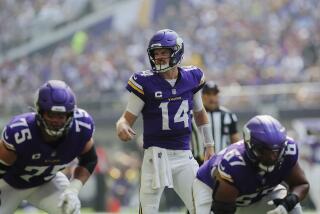Landry Definitely Marched to Beat of His Own Drum
- Share via
In the small Texas town where I grew up, our preacher at the First Baptist church ended sermons about 15 minutes earlier than usual on fall Sundays.
He knew that if he spoke longer, most of his congregation couldn’t concentrate. We’d start fidgeting and looking at our watches, fearing we might miss the start of the Cowboy game.
Not that the Rev. Gerald Perry minded. He wanted to make sure he was home in time for the kickoff too, and, besides, if he had to share us with someone on Sundays, who could be better than Tom Landry?
As the Times’ Jim Hodges wrote Sunday in Landry’s obituary, the God-fearing, Redskin-beating coach was a perfect fit in Texas, “where football and religion are frequently confused.”
Landry was a good Christian and a damn (sorry, Rev. Perry) good football coach. As defensive coordinator for the New York Giants, the head coach, Jim Lee Howell, called him “the best coach in the NFL.” Most significant about that quote is that the offensive coordinator on that staff was Vince Lombardi.
You have head coaches today such as Mike Holmgren and Mike Shanahan who are known for their offensive minds, and Wade Phillips and Jeff Fisher who are known for their defensive minds. Landry was as smart with the Xs as with the O’s.
The 4-3 defense? That was his. He read Lombardi’s “Run to Daylight,” then redesigned his defense to eliminate the daylight, calling it “the Flex.” Then he designed a multiple offense to counter the Flex. The shotgun offense? That wasn’t his. But he brought it back.
His results need no elaboration--five Super Bowls, two championships, 20 consecutive winning seasons, more wins than any coaches other than Don Shula and George Halas.
Landry did that while maintaining that his priorities, in order, were God, family and the Dallas Cowboys.
We used to say in Texas that the reason for the hole in the Texas Stadium roof was so that God could watch his favorite team. A lot of people down there didn’t know it was a joke.
*
Yet, if you knew anything about the Cowboys other than what the mainstream media reported at the height of Landry’s era, you realized that they didn’t exactly march to “Onward Christian Soldiers.”
Long before Michael Irvin and Leon Lett and the excesses under Barry Switzer, former Cowboy tight end Pete Gent wrote in “North Dallas 40” about a fictional team’s sex, drugs and rock ‘n’ roll parties that didn’t sound so fictional considering the many Cowboy players associated with drugs in the early ‘80s.
On the one hand, considering his own rigid standard of behavior, you had to marvel at Landry’s ability to win with so many different personalities. He could coach “Dandy” Don Meredith as well as he could Navy man Roger Staubach, Thomas “Hollywood” Henderson as well as Alabama’s Lee Roy Jordan. Landry, like Switzer, knew that you don’t choose your football team the way you do the choir at the Highland Park Methodist Church.
On the other hand, critics, among them former players besides Gent, wondered if Landry didn’t occasionally confuse his priorities, putting football first by ignoring some off-the-field indiscretions and not others, by not discouraging players from going onto the field with injuries, by his cold and calculated approach.
He said he was a Christian, not a saint.
If we held him to higher standards than other coaches, that was our fault, not his. To his credit, he lived up to them more often than not, and I can’t think of any teams today that couldn’t use a coach, or a man, like him on the sideline.
*
One myth about Landry that should be corrected is that he was humorless.
Except for his pained expression when tight end Jackie Smith dropped a pass in the end zone against Pittsburgh in Super Bowl XIII, no one can recall Landry showing much emotion on the sideline. That demeanor, resulting from his intense concentration, earned Landry the nickname, “Ol’ Stone Face.”
But he could be mischievous, as when former Cowboy owner Clint Murchison, who hired him in 1960 and four losing seasons later gave him a 10-year extension when everyone else wanted him fired, recommended a play call for Bob Hayes to run an end-around.
Landry designed the play to lose yardage, which it did. Murchison learned his lesson, never involving himself in the coaching again, but had a story to dine out on for years.
Once, in New York, a Cowboy-Giant game was interrupted because of a bomb threat in the press box. Asked what he thought would have happened if a bomb had actually exploded there, Landry said, “We would have a moment of silence--then proceeded with vigor.”
*
Randy Harvey can be reached at his e-mail address: randy.harvey@latimes.com.
More to Read
Go beyond the scoreboard
Get the latest on L.A.'s teams in the daily Sports Report newsletter.
You may occasionally receive promotional content from the Los Angeles Times.










